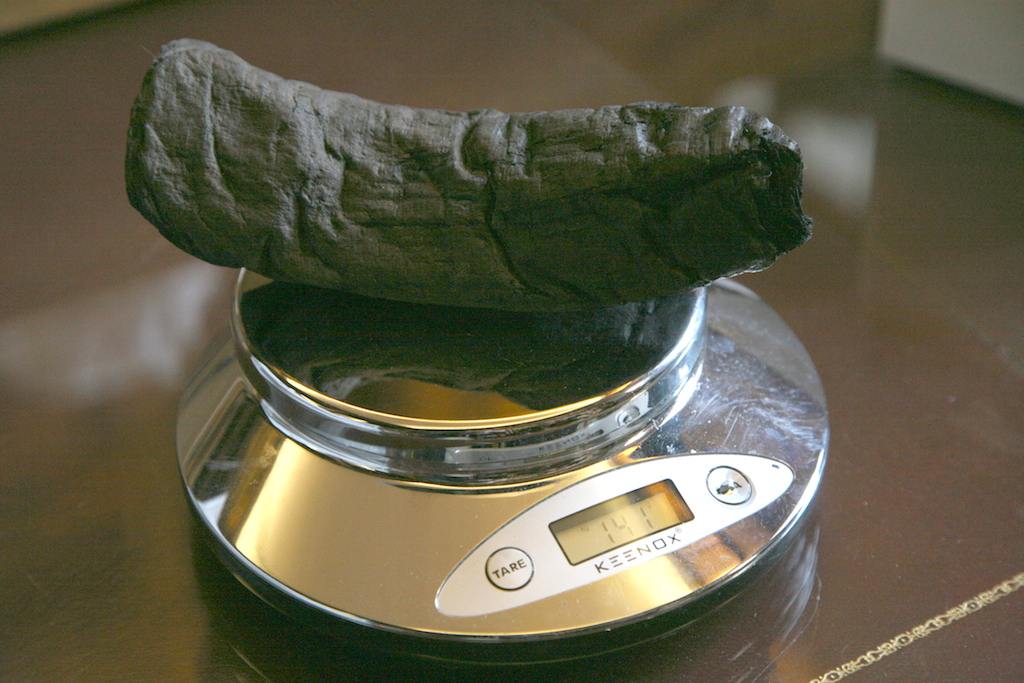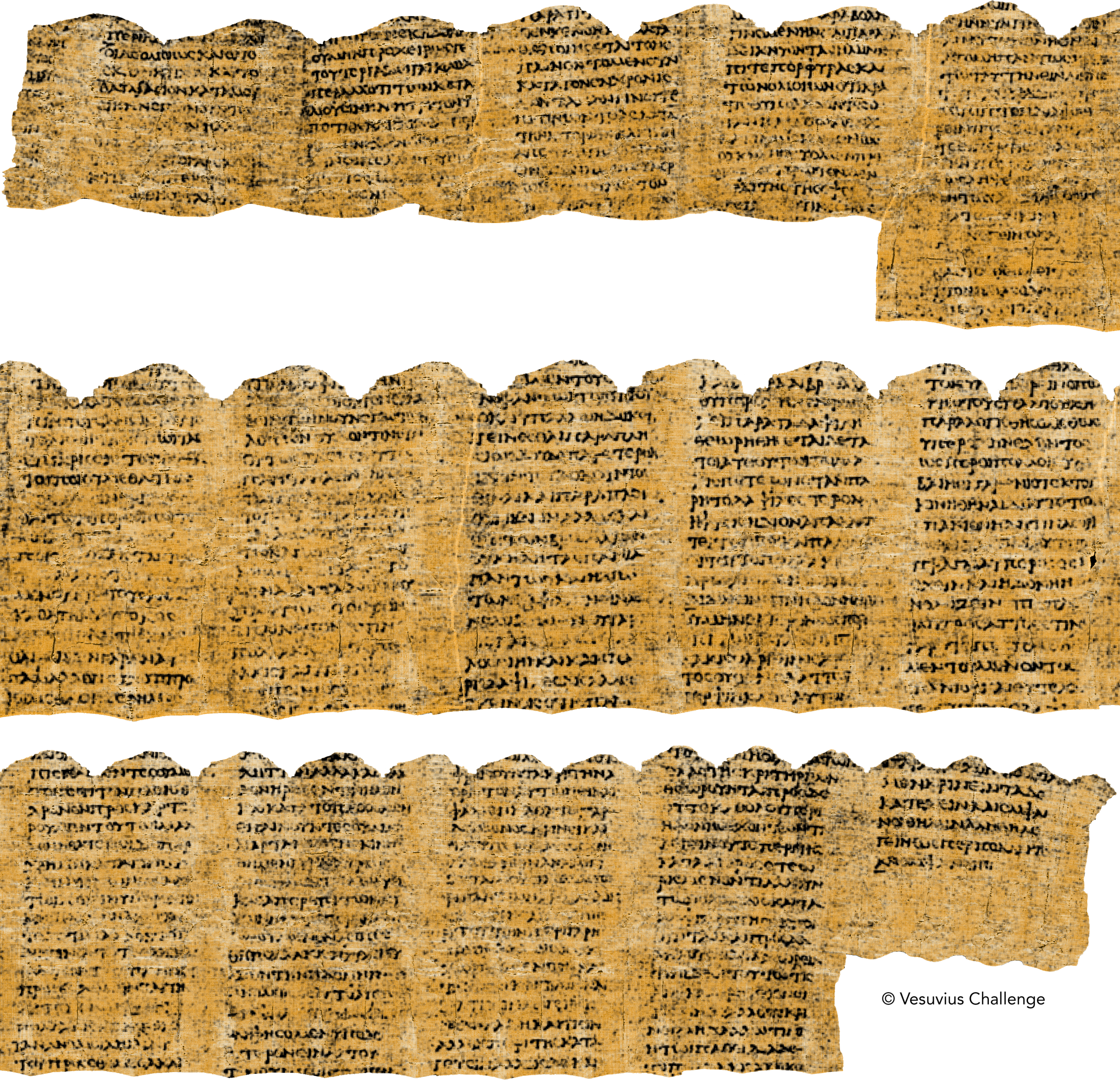
A Roman scroll, partially preserved when it was buried in the eruption of Mount Vesuvius in A.D. 79, has been virtually unwrapped and decoded using artificial intelligence.
The feat was achieved by three contestants in the Vesuvius Challenge, a competition launched in March 2023 in which people around the world raced to read the ancient Herculaneum papyri.
Papyrologists working with the Vesuvius Challenge believe the scroll contains “never-before-seen text from antiquity,” and the text in question is a piece of Epicurean philosophy on the subject of pleasure. The winning submission shows ancient Greek letters on a large patch of scroll, and the author seems to be discussing the question: are things that are scarce more pleasurable as a result?
Read More: Inside the AI-Powered Race to Decode Ancient Roman Scrolls
The author, whose identity is unconfirmed, doesn’t think so: “As too in the case of food, we do not right away believe things that are scarce to be absolutely more pleasant than those which are abundant,” one passage from the scroll reads.

The three members of the winning team had previously individually made significant contributions to the competition. Luke Farritor, a computer science student at University of Nebraska-Lincoln, and Youssef Nader, a machine learning Ph.D. student at Freie University in Berlin, had been two of the first contestants to detect a smaller number of letters, winning $40,000 and $10,000 respectively. Julian Schilliger, a robotics student at ETH Zürich, developed a tool that began to automatically segment the scrolls. They will share the $700,000 grand prize.
Nat Friedman, a tech investor and executive, and one of the challenge’s organizers, recently printed out the winning submission. “All this has been in this dreamlike digital world in my imagination before," Friedman says. "Seeing it on paper, rolling it up, it just made it so tangible.”
More From TIME
There’s a lot more to discover. The scroll partially decoded by the winning submission was one of 800 discovered in a southern Italian villa that was first uncovered in 1750. The combined efforts of the competitors and organizers so far have resulted in around 5% of one scroll being read.
The final scramble to read the scrolls
Since the Vesuvius Challenge launched nearly a year ago, participants had both cooperated and competed, sharing their latest techniques with each other and posting pictures of their progress. But as the race for the grand prize intensified, the Discord, a social media platform where the participants shared information, went dark, says Friedman.
Of the eighteen submissions for the grand prize, most of them were received on the last day of the contest, Dec. 31, and three were sent in the final ten minutes, according to Friedman. Friedman recalls he was at home with his family around Christmas, decorating for the holiday while compulsively refreshing his phone, when the winning submission came in. “I ran into my little office at home and popped it open,” he says. “I was like, ‘Wow, this is really magnificent.’”
In accordance with the criteria set in March 2023, the winning submission contains four passages of 140 characters each, with at least 85% of the characters in each of those passages recoverable by professional papyrologists. It also contains a further 11 columns of text.
It isn’t known who authored the ancient scroll, but experts have developed theories. “Is the author Epicurus' follower, the philosopher and poet Philodemus, the teacher of Vergil? It seems very likely,” writes Richard Janko, professor of classical studies at the University of Michigan. “Is he writing about the effect of music on the hearer, and comparing it to other pleasures like those of food and drink? Quite probably.” Robert Fowler, a professor of Greek at the University of Bristol, also believes the author to be Philodemus. “Like other Epicureans, he valued pleasure above all - but pleasure rightly understood, not mere indulgence,” Fowler writes of the philosopher.
In the final section of the scroll, the author appears to criticize his intellectual adversaries, who “have nothing to say about pleasure, either in general or in particular, when it is a question of definition.”
“I can't help but read it as a 2000 year old blog post, arguing with another poster,” says Friedman. “It's ancient Substack, and people are beefing with each other, and I think that's just amazing.”
What comes next
The Vesuvius Challenge has issued a new grand prize for 2024 that will allow the AI-enhanced decoding to move at a faster pace.
The competitors largely have been developing algorithms for automatic letter detection—using AI to see traces of ink on segments of virtually unrolled scrolls. Aside from letter detection, the other main challenge associated with reading the scrolls is segmentation—separating the layers and virtually unrolling the scrolls. So far, this process has been highly manual; the Vesuvius Challenge employed three full-time segmenters. In order to ensure that they’d have segmented enough of the scroll for someone to win the grand prize, Friedman bought the team new monitors and computers to boost their productivity. The challenge for 2024 is to automate the segmentation process.
Friedman admits that he has had other tempting offers of new quests to pursue. Over the last year, he says his inbox has been filled with Robinson Crusoe-esque proposals, from people alerting him to lost shipwrecks and ancient cities, undecoded languages, and strange glyphs on the sides of mountains.
But he can’t walk away. He wants to help read all of the 800 scrolls already discovered in the villa. And some archeologists believe there is a main library containing tens of thousands of scrolls, still waiting to be excavated.
To expedite the excavation, Friedman has obtained the mobile number of the Italian civil servant responsible for the villa, whom he has texted, twice. “My hope is that I won't have to go and dig it out myself,” says Friedman. “But if that's what it comes to, I will.”
More Must-Reads From TIME
- The 100 Most Influential People of 2024
- Coco Gauff Is Playing for Herself Now
- Scenes From Pro-Palestinian Encampments Across U.S. Universities
- 6 Compliments That Land Every Time
- If You're Dating Right Now , You're Brave: Column
- The AI That Could Heal a Divided Internet
- Fallout Is a Brilliant Model for the Future of Video Game Adaptations
- Want Weekly Recs on What to Watch, Read, and More? Sign Up for Worth Your Time
Write to Will Henshall at will.henshall@time.com